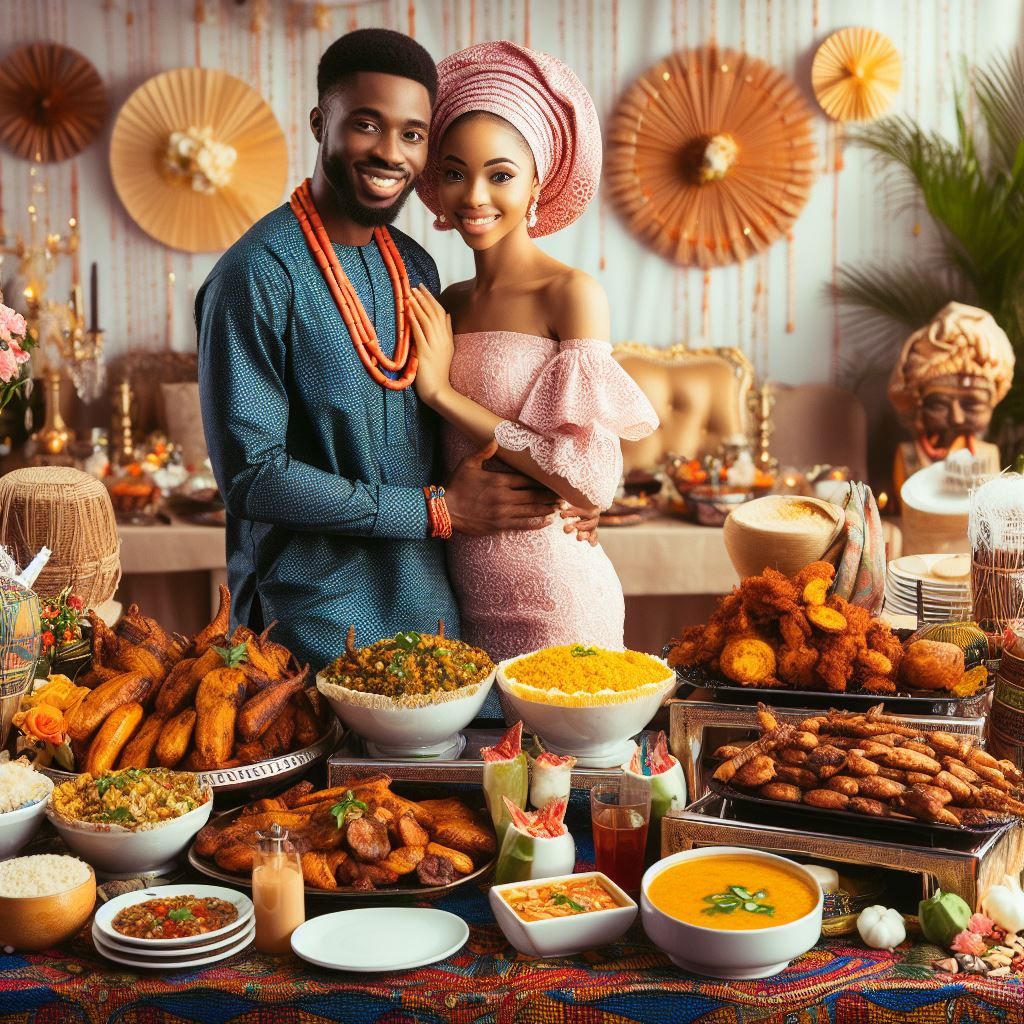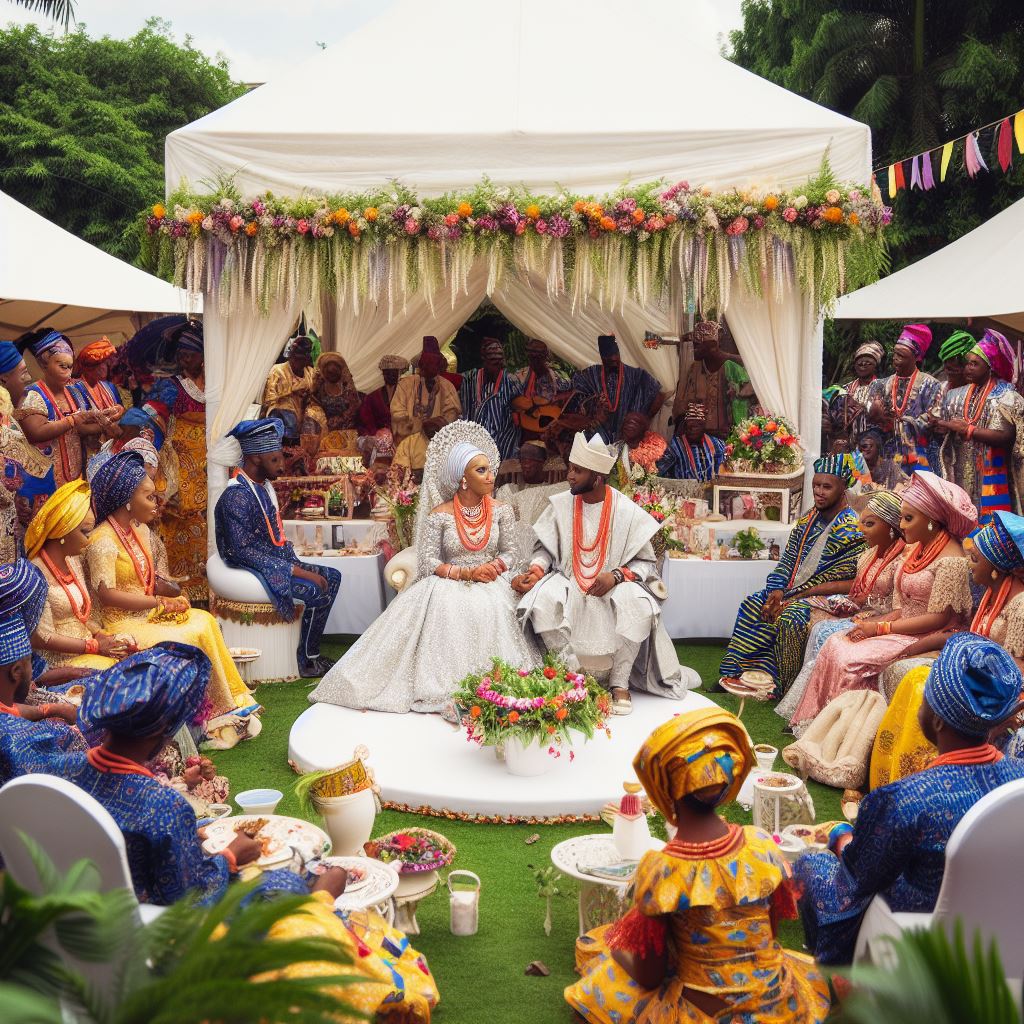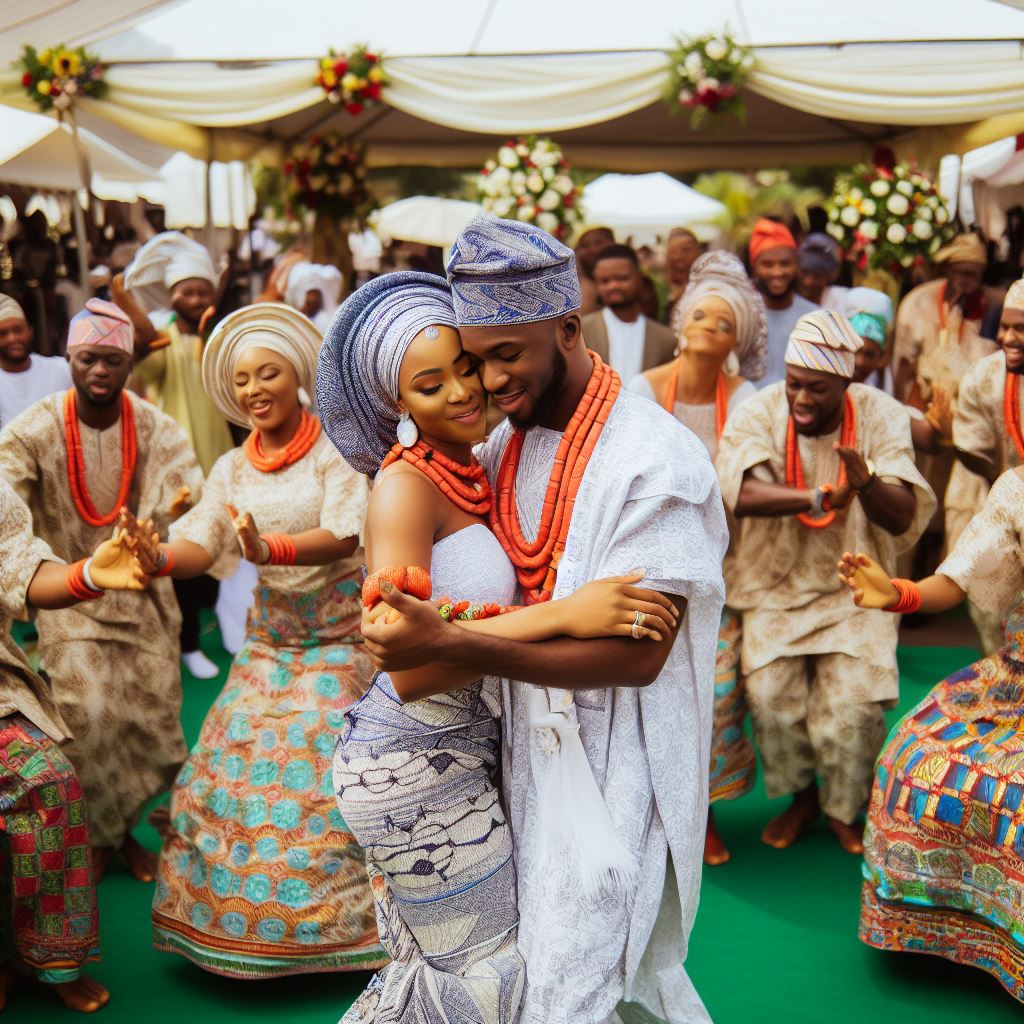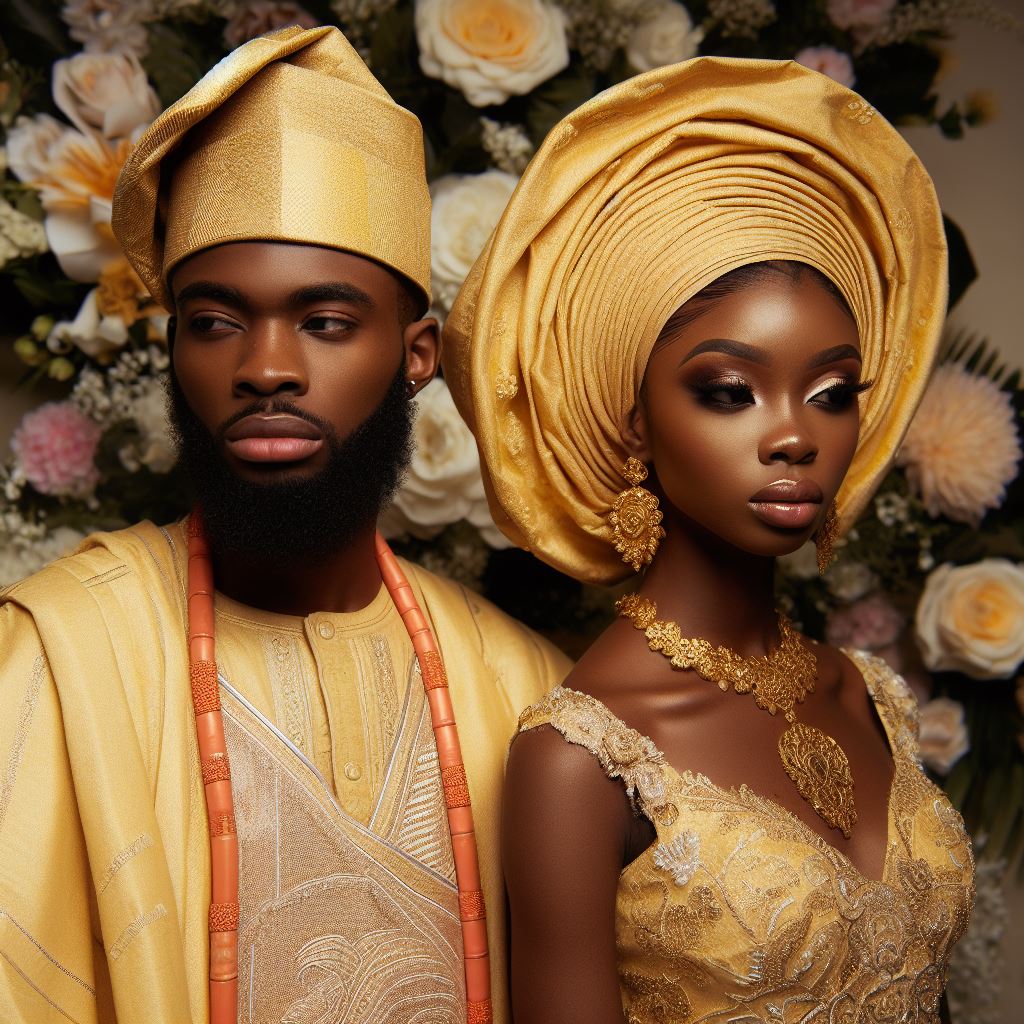Introduction
Definition of Cross-cultural Marriages
Cross-cultural marriages in Nigeria refer to unions between individuals from different cultural backgrounds.
The importance of Cross-cultural Marriages in Nigeria
- These marriages are significant as they promote diversity, understanding, and tolerance in society.
- By bringing people from different cultures together, cross-cultural marriages facilitate cultural exchange and integration.
- They help to break down stereotypes, foster unity, and create a harmonious multicultural society.
- Cross-cultural marriages also contribute to the enrichment of traditions, languages, and customs.
- In Nigeria, where there are over 250 ethnic groups, these marriages help to bridge cultural divides.
- They encourage acceptance and respect for different beliefs, practices, and values.
- Additionally, cross-cultural marriages promote peace-building and social cohesion in diverse communities.
- They have the potential to reduce ethnic and religious tensions that often lead to conflict.
- Furthermore, these marriages enhance economic and diplomatic relations between nations.
- They create opportunities for international collaboration, trade, and investment.
Overall, cross-cultural marriages in Nigeria play a vital role in promoting cultural diversity, peace, and development.
Factors Influencing Cross-cultural Marriages in Nigeria
Globalization and Interconnectedness
- Globalization has led to increased interconnectedness between different cultures and societies.
- People from diverse backgrounds have more opportunities to meet and interact with each other.
- This exposure to different cultures has made cross-cultural marriages more acceptable and common in Nigeria.
- Globalization has also made it easier for individuals to connect and build relationships with people from foreign countries.
Education and Career Opportunities
- Increased access to education and career opportunities has contributed to the rise of cross-cultural marriages.
- Nigerians are now studying and working in different parts of the world, leading to the formation of international relationships.
- Education abroad exposes individuals to different cultures and increases the likelihood of cross-cultural marriages.
- The desire to pursue higher education or career prospects in a foreign country often leads to cross-cultural marriages.
Increased Migration and Cultural Diversity
- The movement of people has increased in recent years, leading to cultural diversity in Nigeria.
- As more Nigerians migrate to different countries, they form relationships and marriages with individuals from those cultures.
- The presence of immigrants in Nigeria has also contributed to cross-cultural marriages within the country.
- Interactions between different cultural groups have created opportunities for cross-cultural marriages to occur.
Relocation and Resettlement
- Relocation and resettlement due to work or personal reasons can lead to cross-cultural marriages.
- When individuals move to a new place, they often form relationships with people from the local culture.
- The process of resettlement involves adapting to a new culture and can facilitate the formation of cross-cultural marriages.
- Cross-cultural marriages resulting from relocation and resettlement contribute to cultural exchange and integration.
In short, several factors influence the prevalence of cross-cultural marriages in Nigeria. Globalization and interconnectedness have made it easier for people from different cultures to meet and form relationships.
Education and career opportunities abroad increase the likelihood of cross-cultural marriages. Increased migration and cultural diversity in Nigeria also contribute to cross-cultural marriages.
Additionally, relocation and resettlement play a role in facilitating cross-cultural marriages. These factors collectively promote cultural exchange and integration in Nigerian society.
Read: Challenges of Upholding ‘The Bed Undefiled’ in Modern Nigeria
Benefits of Cross-cultural Marriages in Nigeria
A cross-cultural marriage refers to a union between individuals from different cultural backgrounds.
In Nigeria, these marriages have become more prevalent in recent years, offering numerous benefits for both individuals and society at large.
Cultural exchange and appreciation
Cross-cultural marriages provide an opportunity for individuals to learn about and appreciate different cultures.
Through intermarriage, spouses can share their traditions, customs, and languages, fostering a greater understanding and respect for each other’s cultural heritage.
Breaking stereotypes and fostering tolerance
Intercultural marriages challenge stereotypes and preconceived notions about other cultures.
By experiencing firsthand the richness and diversity of different cultural backgrounds, individuals can develop a more open-minded and accepting attitude towards people from all walks of life.
Bridging gaps and promoting unity
Cross-cultural marriages have the potential to bridge gaps between different ethnic, religious, and regional groups in Nigeria.
When individuals from diverse backgrounds come together in marriage, they form a bond that transcends cultural barriers, promoting unity and a sense of belonging among communities.
Enhancing socio-economic development
Intercultural marriages can also contribute to socio-economic development in Nigeria. When individuals marry someone from a different culture, they bring together a range of skills, knowledge, and resources.
This diversity can lead to increased innovation, entrepreneurship, and economic opportunities for both individuals and their communities.
In fact, cross-cultural marriages bring several benefits for individuals and society in Nigeria.
They facilitate cultural exchange and appreciation, break stereotypes, bridge gaps, and contribute to socio-economic development.
These marriages promote diversity, respect, and unity, making Nigeria a more vibrant and inclusive society as a result.
Read: Exploring Hebrews 13:4: The Sanctity of Marriage in Nigeria
Challenges of Cross-cultural Marriages in Nigeria
In cross-cultural marriages in Nigeria, couples often face various challenges that arise from differences in language, traditions, customs, cultural expectations, societal judgments, and stereotypes.
Language and communication barriers
- One of the main challenges in cross-cultural marriages in Nigeria is the language barrier.
- Couples from different cultural backgrounds may speak different languages, making communication difficult and leading to misunderstandings.
- It requires effort and patience to overcome this challenge by learning each other’s languages or finding a common language to communicate effectively.
Differences in traditions and customs
- Couples in cross-cultural marriages in Nigeria often encounter conflicts due to differences in traditions and customs.
- From the way celebrations are conducted to family roles and expectations, couples need to find a compromise and respect each other’s cultures to avoid conflicts and misunderstandings.
Adjusting to new cultural expectations
- When entering a cross-cultural marriage in Nigeria, individuals must adapt to new cultural expectations and norms.
- This may include changes in clothing styles, dietary habits, religious practices, and social etiquettes, which can be challenging and require open-mindedness and flexibility from both partners.
Dealing with societal judgments and stereotypes
- Cross-cultural marriages in Nigeria often face societal judgments and stereotypes from family members, friends, and the wider community.
- Some people may not approve of such marriages due to cultural biases or prejudices, leading to discrimination and ostracization.
- It requires strength and resilience from the couple to face these challenges, educate others, and create a supportive network of like-minded individuals who accept and celebrate their union.
Basically, cross-cultural marriages in Nigeria come with their fair share of challenges. Language and communication barriers, differences in traditions and customs, adjusting to new cultural expectations, and dealing with societal judgments and stereotypes can all pose difficulties for couples.
However, with understanding, patience, flexibility, and the willingness to learn and embrace each other’s cultures, couples can overcome these challenges and build a strong and harmonious union.
Read: Guide to Picking Venues for Marriage Functions in Lagos

Success Factors in Cross-cultural Marriages in Nigeria
Effective communication and understanding
- Clear and open communication is essential for a successful cross-cultural marriage.
- Couples should make an effort to understand each other’s language and cultural nuances.
- Active listening and empathy help in resolving conflicts and misunderstandings.
- Regular communication strengthens the bond and fosters mutual trust.
- Expressing emotions, thoughts, and concerns openly contributes to a harmonious relationship.
Respect for each other’s cultural values
- Mutual respect for cultural differences is crucial for the success of cross-cultural marriages.
- Partners should appreciate and embrace each other’s traditions, customs, and beliefs.
- Avoiding judgment and derogatory remarks about each other’s culture fosters harmony.
- Respecting and incorporating cultural practices in daily life strengthens the marital bond.
- Understanding that cultural values shape identities and behaviors promotes acceptance and unity.
Open-mindedness and flexibility
- Both partners should have an open mind and be willing to adapt to new cultural experiences.
- Flexibility in accommodating different customs and traditions creates a peaceful environment.
- Being open to learning and incorporating diverse perspectives enriches the relationship.
- Embracing change and being adaptable help overcome cultural barriers and conflicts.
- Accepting differences and being willing to compromise lead to a strong cross-cultural marriage.
Supportive networks and communities
- Having a supportive network of friends, family, and communities can positively impact cross-cultural marriages.
- Surrounding oneself with people who understand and appreciate multicultural relationships provides emotional support.
- Engaging with like-minded couples in similar situations fosters camaraderie and shared experiences.
- Seeking guidance from mentors or joining support groups helps navigate challenges and difficulties.
- Having a strong support system creates a sense of belonging and enhances marital satisfaction.
Ultimately, successful cross-cultural marriages in Nigeria are influenced by various factors.
Effective communication and understanding establish a strong foundation, while respect for each other’s cultural values promotes unity.
Open-mindedness and flexibility enable couples to adapt and grow together. Additionally, having supportive networks and communities provides emotional support and guidance.
By embracing these success factors, couples in cross-cultural marriages can overcome challenges and build fulfilling lifelong relationships
Read: The Role of Aso Ebi in Nigerian Wedding Functions
Famous Examples of Cross-cultural Marriages in Nigeria
Cross-cultural marriages in Nigeria have produced some remarkable success stories.
Case studies of successful cross-cultural marriages
- Emeka and Sophia: A Nigerian and American couple who have managed to blend their cultures harmoniously.
Despite the challenges they initially faced, they have managed to create a harmonious household where both Nigerian and American traditions are celebrated. - Abdullahi and Lisa: A Nigerian-Muslim and British-Christian couple who have overcome religious differences in their marriage.
They have successfully navigated their religious differences and have built a strong foundation of respect and understanding. Their love for each other has been the driving force in bridging the gap between their cultures. - Chinedu and Mei Ling: A Nigerian and Chinese couple who have embraced both Nigerian and Chinese traditions, creating a unique and rich family dynamic.
Their love and open-mindedness have been instrumental in making their cross-cultural marriage a success. - Segun and Maria: A Nigerian and Brazilian couple who have merged their cultural practices to create a unique family dynamic.
Their ability to embrace and appreciate each other’s backgrounds has made their marriage thrive. - Olu and Fiona: A Nigerian and Irish couple who have navigated cultural challenges with respect and understanding.
Their commitment to accepting and learning from each other’s traditions has strengthened their bond.
Profiles of Influential Individuals in cross-cultural Marriages
In addition to these case studies, there are influential individuals who have made significant contributions to promoting cross-cultural marriages in Nigeria
- Taiwo Adeleke: A Nigerian entrepreneur who is married to a German woman and promotes cultural diversity through his work.
- Chika Okonkwo: A Nigerian author who is married to a Swedish man and writes about the beauty of cross-cultural love.
- Yemi Ojo: A Nigerian politician who is married to a Japanese woman and advocates for the acceptance of multicultural relationships in society.
He challenges societal norms and encourages others to embrace love regardless of cultural differences. - Obinna Okoro: A Nigerian musician who is married to a French woman and incorporates elements from both cultures in his music, bridging the gap between Nigerian and French musical traditions.
- Ngozi Ekezie: A Nigerian fashion designer who is married to a Mexican man and showcases the fusion of Nigerian and Mexican fashion in her designs.
Through her work, she celebrates the unique cultural heritage of both countries and highlights the beauty of cross-cultural collaborations.
These influential individuals and successful case studies of cross-cultural marriages in Nigeria serve as inspiring examples for others.
They demonstrate that love, respect, and open-mindedness are essential in making such marriages thrive and enrich the cultural landscape of Nigeria.
Conclusion
A recap of the importance and benefits of cross-cultural marriages in Nigeria
Above all, cross-cultural marriages in Nigeria offer numerous benefits and advantages. They provide an opportunity for cultural exchange, promoting diversity and tolerance.
Such unions help to bridge the gap between various ethnic groups and foster unity in the country.
Encouragement for individuals to embrace and celebrate cross-cultural unions in Nigeria
- By celebrating cross-cultural unions, Nigeria can create a society that embraces diversity and rejects discrimination based on ethnicity or cultural background. This, in turn, will lead to a more united and harmonious nation.
- Lastly, cross-cultural marriages in Nigeria play a significant role in promoting cultural integration and harmony.
- They contribute to the overall development and advancement of the country by fostering understanding and mutual respect among different ethnicities.
- It is important for individuals to embrace and celebrate these unions as they offer immense benefits to society as a whole.




